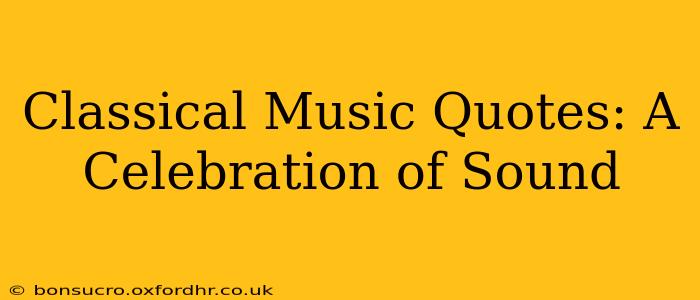Classical music, a timeless tapestry woven with notes of joy, sorrow, triumph, and reflection, has inspired countless artists, thinkers, and listeners for centuries. Its profound impact transcends mere entertainment; it touches the soul, provoking contemplation and igniting passion. This exploration delves into the wisdom and wit encapsulated in quotes about classical music, offering a glimpse into its enduring power and enduring legacy. We’ll explore the beauty, the challenge, and the sheer emotional force that makes classical music so uniquely captivating.
What Makes Classical Music So Special?
Many find themselves drawn to the intricate structures and emotional depth found within classical compositions. The sheer skill and artistry involved in performance, the history woven into each note, and the enduring relevance of the themes explored all contribute to its timeless appeal. It's not just about the notes themselves, but the way they intertwine, build, and resolve, creating an experience that is both intellectually stimulating and profoundly moving.
Why Do People Love Classical Music?
This question is as multifaceted as the music itself. Some are captivated by the technical brilliance, the precise execution of complex pieces. Others find solace and peace in the melodies, allowing the music to wash over them and alleviate stress. Many appreciate the historical context and the stories embedded within each composition. Ultimately, the appeal of classical music is deeply personal, resonating differently with each listener.
What are the Benefits of Listening to Classical Music?
Studies suggest that listening to classical music can improve cognitive function, reduce stress levels, and even enhance creativity. The complex harmonies and rhythms can stimulate brain activity, while the emotional depth of the music provides a powerful outlet for feelings. However, the benefits are subjective; the impact of listening to classical music will differ based on personal preferences and individual experiences.
Is Classical Music Difficult to Understand?
While the technical complexities of some classical pieces might seem daunting, the emotional impact is often universally accessible. One doesn't need a formal musical education to appreciate the beauty of a Beethoven symphony or the elegance of a Mozart concerto. The key is to approach it with an open mind and heart, allowing the music to speak directly to your emotions. Begin with pieces known for their accessibility and gradually explore more challenging works.
How Can I Appreciate Classical Music More?
Appreciating classical music is a journey, not a destination. Begin by exploring different composers and periods, listening to a variety of works. Attend live performances if possible, as the experience of hearing classical music performed live is incredibly powerful. Read program notes and biographies of composers to deepen your understanding of the context and intentions behind the music. Don't be afraid to experiment and find what resonates with you.
Famous Quotes About Classical Music
Many renowned figures have eloquently expressed their feelings about the power and impact of classical music. While a comprehensive list is impossible within this context, here are a few examples to inspire further exploration:
- "Music is the universal language of mankind." – Henry Wadsworth Longfellow: This quote beautifully encapsulates the transcendent power of music to connect people across cultures and generations.
- "Music washes away from the soul the dust of everyday life." – Berthold Auerbach: This quote highlights the cleansing and restorative power of classical music, offering respite from the stresses of daily life.
- "Life without music would be a mistake." – Friedrich Nietzsche: This bold statement underlines the essential role that music, and by extension, classical music, plays in enriching the human experience.
These quotes, and countless others, demonstrate the profound and lasting impact of classical music on society. The ongoing legacy of classical music continues to inspire and move us, a testament to its inherent beauty and enduring power. Its exploration is a journey of self-discovery, a voyage into the heart of human emotion, and a celebration of the sheer brilliance of sound.
